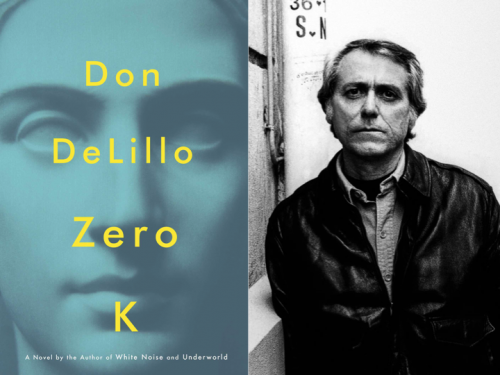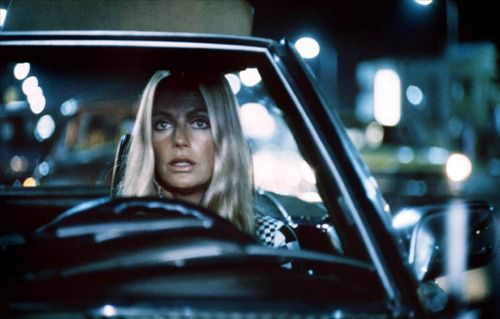
My two favorite entertainments this year were Greg Jackson’s Prodigals – a collection of short stories on seekers at various life stages – and Luca Guadagnino’s A Bigger Splash – a sleek, psychological drama set on a gorgeous Italian island. This post is about books, but I wanted to mention the film because it hasn’t appeared on the site yet, and it’s one that our consumption patterns indicate could be of interest. Here’s a scene from the movie that’s up there with the “City of Stars” montage in La La Land and Michelle Williams’ impromptu run-in with Casey Affleck in Manchester by the Sea for my most memorable of the year.
Fiennes’ only competition for zaniest dance moves is Oscar Isaac.
Anyway, back to the bookshelf. 2016 had a lot to offer fiction fans out there: as always, there were plenty of books that I wanted and/or intended to read that warped into the Law of “What You Should Read” and were thus left unopened. Even accounting for the time and energy wasted skipping out on those books, there was more than enough to keep me going with gusto. Here are six of my favorites:
Sweetbitter by Stephanie Danler. 
As I was reading a review of this book in the Sunday paper, I could hear that coaxing, seductive voice of consumerism telling me that I must go out and buy it as soon as possible. Buy me, buy me, the voice said sweetly. I did later that night, and reading it was a real delight. “Sweetbitter” centers on a young woman who moves to New York and gets a job at a high end restaurant. The novel has all the familiar characteristics of a bildungsroman, and its main character those of a curious seeker in the Big City. Her successes and failures are cheering and heartbreaking in turns, but she commands an easy empathy. This is thanks in large part to Danler’s singing prose throughout. The author was super fun to read up on – her own background working in a West Village restaurant while earning her MFA and the editor who she had served for a few years agreeing to read her manuscript. Juicy tidbits on life for hip food service industry people in New York, the delicious food and wine they serve up and the opportunities that elude them or they choose to turn down – these are the salient territories of Danler’s debut.
Carousel Court by Joe McGinnis Jr.
This novel is bristling. I found it thanks to KCRW’s Bookworm – a feature on their book club that truly delivered – excellent in itself and leading me to verdant reading ground this fall. Son of an award-winning historian who he beautifully elegized this summer, McGinnis’ novel doesn’t owe literary debts on that count. He instead takes from Joan Didion’s “Play it as it Lays” and Bret Easton Elis’ “Less Than Zero”, writing a “So-Cal Hell novel.” Like the warm climate and promise of fame held in their setting, these novels are endlessly, nihilistically appealing. “Carousel Court” captures the pre-eminence of conversation via text message scarily well. Novelists have tried this in various ways, but McGinnis gets the anxiety of waiting for a response, the bitterness layered underneath texts to close ones and the hurtful message of sending nothing at all. A couple moves from the East Coast with the promise of fortune and freedom from college pals and their ambitions deteriorate alongside their relationship. They live in a foreclosure-laden suburb that’s reminiscent of the Las Vegas section in “Goldfinch” and Southwest Florida in The Big Short – a haunting post-2008 setting. If you have the stomach, this one is really good.
Innocents and Others by Dana Spiotta.
The premise of this book piqued my interest but Dana Spiotta’s perceptive writing and eye for detail drove me to fall in love with it. “Innocents” traces the friendship of two girls growing up with a shared passion for film. Like Don Delillo, who’s listed in the acknowledgments, Spiotta doesn’t shy away from TV and film, instead seizing on the ubiquitousness of images to aid and inform books. “In our world we sleep and eat the image and pray to it and wear it too,” Delillo writes. The girls in the novel go to film school together and then diverge in their careers. One has mainstream success making rom-coms with winking meet-cutes and marries a safe, friendly man who happily overeats with her. The other takes an edgier route and makes critically acclaimed documentaries, but she has the narcissist’s nose for the fantastic and she often takes short cuts or exploits her subjects and hasn’t been very happy in her relationships. They both “make it” in a certain worldly sense, but the state of their souls is the interesting fulcrum of the book. “Eat The Document,” another Spiotta novel I really enjoyed, is an interesting counterpart to Emma Cline’s “The Girls” from this year – tackling the wanderlust of young suburban teens and the allure of a bohemian, communal lifestyle on the West Coast.
Zero K by Don Delillo
 The novel flows from the ominous figure struck by a set of geometric slabs in the desert. The narrator describes this central image in the opening pages; “I imagined it as a city to be discovered at a future time, self-contained, well-preserved, nameless, abandoned by some unknown migratory culture.” The structures cover an elaborate underground compound housing scientists and design minds working at a mysterious project involving cryogenics. A billionaire funds the research and plans to be an early subject. He’s a master of the universe taking that title to its logical extreme. His son, the smart but underachieving narrator of the novel, has understandably complicated feelings about this. Delillo’s level of insight in “Zero K” lends a certain redemption to the ugly truths behind his observations. Waiting to board a flight, his narrator reflects, “I maintain myself on the puppet drug of personal technology. Every touch of a button brings the neural rush of finding something that I never knew and never needed to know until it appears at my anxious fingertips, where it remains for a shaky second before disappearing forever.” Delillo has an eye for the little humanizing minutiae of our daily lives, even if it’s despairing to think of our phones as “puppet drugs,” the weight of that image reminds us how much technology is in our shared vocabulary now, fodder for writers and artists, and not simply for algorithms.
The novel flows from the ominous figure struck by a set of geometric slabs in the desert. The narrator describes this central image in the opening pages; “I imagined it as a city to be discovered at a future time, self-contained, well-preserved, nameless, abandoned by some unknown migratory culture.” The structures cover an elaborate underground compound housing scientists and design minds working at a mysterious project involving cryogenics. A billionaire funds the research and plans to be an early subject. He’s a master of the universe taking that title to its logical extreme. His son, the smart but underachieving narrator of the novel, has understandably complicated feelings about this. Delillo’s level of insight in “Zero K” lends a certain redemption to the ugly truths behind his observations. Waiting to board a flight, his narrator reflects, “I maintain myself on the puppet drug of personal technology. Every touch of a button brings the neural rush of finding something that I never knew and never needed to know until it appears at my anxious fingertips, where it remains for a shaky second before disappearing forever.” Delillo has an eye for the little humanizing minutiae of our daily lives, even if it’s despairing to think of our phones as “puppet drugs,” the weight of that image reminds us how much technology is in our shared vocabulary now, fodder for writers and artists, and not simply for algorithms.
Here I Am by Jonathan Safran Foer
Taken from the story of Abraham and Isaac, the title shows the emotional and spiritual plane Jonathan Safran Foer was shooting for with his third novel. Set in the contemporary U.S. with tensions boiling over in the Middle East, the novel goes macro with some geo-political conjecture and micro with the dissolution of a marriage. The husband, a double for Foer, writes for a popular HBO show that sounds a lot like Game of Thrones while he works on a more “serious” family drama on spec. He’s neurotic, anxious, and, despite his apparent success, has got by basically on doing what his family and the world expect from him. When his wife discovers some dirty text messages he sent to a woman from work, she takes it as a sign of his deadness as a father and husband to her that he couldn’t even act on a sure thing. The issues at stake are timely, the illustrations are funny and poignant and the writing is what you’d expect from an intelligent contemporary social novel.
Prodigals by Greg Jackson
One of the National Book Foundation’s 5 under 35 honorees this year, Greg Jackson has the cool wit of a perceptive cultural participant whose mastered DFW and is ready to try his hand at the humorous and heartbreaking work of breaking new ground in fiction. “Wagner in the Desert” turned heads (or left them feeling taken off) when it appeared in the New Yorker in 2014, and the rest of the stories in “Prodigals” don’t disappoint. In “Metanarrative Breakdown,” the finale and spiritual climax of the book, the narrator gets into a hilariously perceptive account of life for high-minded seekers, that is, those who listen to that bastion of decency and objective reporting, NPR.
“I don’t remember how I made it back. I must’ve turned around, but honestly it’s all a blur. A blur not because it went by fast, but in the sense that the recording of a voice slowed down sufficiently no longer resembles a voice. I credit Terry Gross with getting me home, the grounding cadence of her speech, a metronomic standard by which my subjective experience of time was kept from veering into
a fatal adagio. And soon enough – or, you know, whenever – I found myself back in the sunny yard, watching Gabrielle articulate her body in serpentine asanas, listening to Terry interview an author I like, and then an actress I like, as happy as a puppy and at peace, because what I understood just then was that Terry Gross’s voice was the voice of the metanarrative, demotic ur-parent, Catcher in the WHYY, the call of the shepherd returning me to the pastures of solicitude and moderation, that cultural plane on which the day’s horrific news – ecocatastrophe, civilizational conflict, postcolonial scarring, and our legacies of violence and extortion – was not diminished or ignored but existed in a strange vaporous adjacency to yuppie mores, triumphalist life narratives, midcult art, and an anachronistic fixation on jazz, this narrow-bandwidth refugium for temperamental decency and civic virtue and a heartbreaking reasonableness that seemed less and less like the earned wisdom of life than a tragic hope laid over it.”
When I was first reading these stories the weekend before my college graduation, they swept me into a sort of fugue state ala Percy’s last gentleman, Will Barrett. I was even forced to read some passages aloud to annoyed friends in order to stay this spontaneous overflow of powerful feeling. “Do you remember what it’s like to go home with the person you love? Do you? Don’t say yes. Remember. Stay there with me, linger. Then make me laugh while we drive home.”
Books from 2016 I want to read very soon:
The Mothers by Brit Bennett; The Underground Railroad by Colson Whitehead; Commonwealth by Ann Patchett; The Throwback Special by Chris Bachelder.

COMMENTS
One response to “One Reader’s Favorite Fiction from 2016”
Leave a Reply















So many books, so little time!